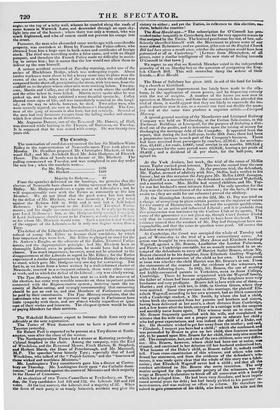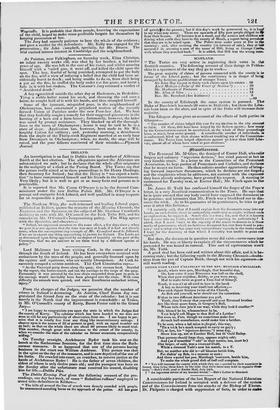At the York Assizes, last week, the trial of the
cause of Malin versus Taylor excited great interest. This was the second time the case
had been brought before a Jury. At the previous trial, the defendant, Mr. Taylor, accused of adultery with Mrs. Mellin, hada verdict in his favour ; but on this occasion the Jury gave Mr. blellin 1,000/. damages.
The plaintiff is a manufacturer; the defendant a solicitorof Wakefield, and a married man. Mrs. Mellin had several children, and Mr. Tay- lor was her husband's most intimate friend. The only question for the Jury was the trustworthiness of the witnesses ; for the facts, if true as sworn to (they are unfit for our columns) proved the adultery.
At the Huntingdon Assizes, on the 22d, Mr. G. Day was tried on a charge of conspiring to place certain parties on the register of voters
for the comity of Huntingdon, who had not the requisite qualification.
Mr. Day is an active and influential Liberal ; and it is probable that this prosecution was instituted by the Carlton Chili or its agents. The name of the Rrosecutor was not giyen up, though Chief Justice Tindal said that in common fairness it ought to have been disclosed. The evidence proved that the conduct of Mr. Day had throughout been un- impeachable, and that the votes in question were good. Of course the defendant was acquitted.
At Cambridge, the Court was occupied the whole of Tuesday and part of Wednesday in the trial of a very extraordinary cause. An action was brought by two sisters, Mary Anne arid Elizabeth Godfrey Wagstaff, against a Mr. Bruere, Leadbitter the London Policeman, and Faiers a Cambridge constable, for an assault committed in an at- tempt of the defendants to carry off Harriet Sadlei'Bruere, whom Mr. Bruere claimed to be his daughter, from Elizabeth Godfrey Wagstaff, who had obtained possession of the child as her own. The real point at issue was whether the child Harriet was Mr. Bruere's or not. From the statements of the counsel and the evidence of the witnesses, we gather the following facts. In 1825, Mr. Bruere, the son of wealthy and highly-connected parents in Yorkshire, went to Jesus College, Cambridge. There he became acquainted with the Wagstaff family, the father of whom had been an upholsterer. The daughters were very handsome and very profligate. Bruere fell in love with one of them,-.. Harriet ; and eloped with her, in 1826, to Gretna Green, where they were married. Some time previous to this marriage, the plaintiff Eli- zabeth Wagstaff, according to her own account, had an illicit connexion with a Catnbridge student, a Mr. Smith, by whom she had a child, whose birth she concealed from her parents and brothers and sisters, having been delivered at her aunt's, a short distance from Cambridge, and, a few hours after the birth, conveyed in a carriage with the surgeon and monthly nurse home again. This witness went on to state, that Mr. Bruere frequently quarrelled with his wife, and complained to witness that his wife was not a proper person to educate her child; who had great expectations, and was indeed the child of a Duke, not his. He therefore wished to get her away from the mother ; and said, "Elizabeth. I suspect you have had a child ;" which she confessed, and was persuaded by Bruere to give up her child, then fourteen months old, to be passed upon Mrs. Bruere for her child, then only nine months old. The complexion, hair, and size of the two children, were very differ- ent: Mrs. Bruere, however, whose child bad been out at nurse, was. cheated, and continued in her delusion till her husband undeceived her. What became of the Duke's child, as Bruere called it, nobody could
tell. From cross-examination of this witness, and others who con- firmed her statement, and from the evidence of the defendant's wit- nesses, it was made quite clear that the whole of this story was a fabri-
cation ; that Elizabeth Wagstaff never had a child ; and that all the conduct attributed to Mr. Bruere VMS mere invention. The only
motive assigned for the systematic perjury of the witnesses, was re- venge at Bruere's declaration to break off all connexion with a !WWI"' which had pillaged him. He had been very dissolute, and been impri- soned several years for debt ; but had lately yielded to his parents re- monstrances, and was making an effort to reform. He therefore re- solved to gain possession of his child, who lived with his wife and tbel Wagstaffs. It is probable that these people, knowing the expectations of the child, hoped to make some profitable bargain for themselves by keeping possession of her. The Jury had scarcely patience to bear the whole of the evidence; and gave a verdict for the defendants. Mr. Kelly was engaged for the prosecution ; Sir John Campbell, specially, for Mr. liruere. The trial excited intense interest in Cambridge and the neighbourhood.



























 Previous page
Previous page